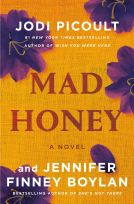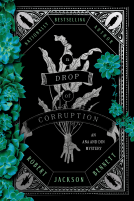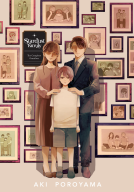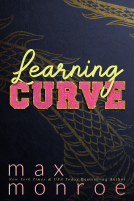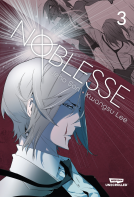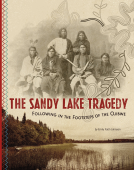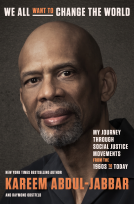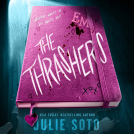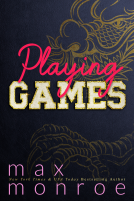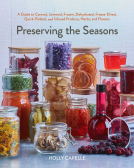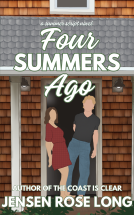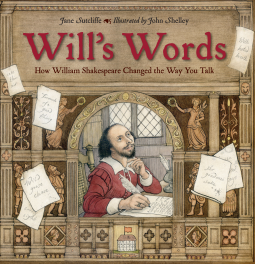
Will's Words
How William Shakespeare Changed the Way You Talk
by Jane Sutcliffe
This title was previously available on NetGalley and is now archived.
Send NetGalley books directly to your Kindle or Kindle app
1
To read on a Kindle or Kindle app, please add kindle@netgalley.com as an approved email address to receive files in your Amazon account. Click here for step-by-step instructions.
2
Also find your Kindle email address within your Amazon account, and enter it here.
Pub Date Mar 22 2016 | Archive Date Nov 13 2015
Description
But, Jane embraces her dilemma, writing about Shakespeare, his plays, and his famous phrases with glee. After all, what better words are there to use to write about the greatest writer in the English language than his very own? As readers will discover, "the long and the short of it" is this: Will changed the English language forever.
Backmatter includes an author’s note, a bibliography, and a timeline.
A Note From the Publisher
Marketing Plan
Twitter feed dedicated to Will's WordsSelect advertisingLocal author visits (including a possible event at the Folger Shakespeare Library in DC)
Available Editions
| EDITION | Other Format |
| ISBN | 9781580896382 |
| PRICE | $17.95 (USD) |
Links
Average rating from 29 members
Featured Reviews
 Sara P, Reviewer
Sara P, Reviewer
Un gioiellino.
Ecco cosa ho scoperto e richiesto per puro caso, vincendo un viaggio nella ricchissima vita teatrale della Londra di fine 1500, con i suoi copioni scritti e rappresentati freneticamente, i suoi attori tutti uomini, il rumore e il cibo e le urla del pubblico, e sulla scena le opere di quello che verrà considerato il più grande autore di sempre.
e in più - come se non bastasse - un viaggio nel tempo attraverso le sue parole: espressioni che Shakespeare ha creato, e rinverdito, o reso immortali, e che oggi ci scivolano di bocca senza che sospettiamo la loro origine: Macbeth, o Otello, o Le allegre comari di Windsor.
E quello che è più sorprendente, è vedere come alcune abbiano varcato allegre non sollo le frontiere del tempo, ma anche quelle delle nazioni, e si ritrovino pari pari in italiano. Perché "quel che è fatto è fatto"!
Ricchissime le illustrazioni, spesso con scorci arditi sulla città o nei teatri, e dettagliatissime rappresentazioni di abiti e acconciature; brillanti e divertenti i testi sul teatro e la vita nella Londra del XVI secolo; e gustosissime le espressioni, il loro significato (con l'analisi di eventuali slittamenti dai tempi di Will a oggi) e le citazioni originali.
E adesso, vorrei tantissimo mettere le zampine sul libri che l'autrice ha dedicato al David di Michelangelo! *___*
 John L, Reviewer
John L, Reviewer
A very good book for the young – with huge, greatly detailed and artistic splash pages we get just a few key words about the relevant subject, namely William Shakespeare and the world of the theatre he worked in. The text uses words and phrases that are common to us but made their debuts in Shakespeare, thus creating the USP of this book – so many could tell us about the nature of The Globe performances, but none branches out into a box-out every page to point us to what his neologisms meant and mean now, if different, and where and in what context we can find them. Some of the instances are used a little cheaply or cheesily, but on the whole they fit perfectly with the narrative, and it's great the way just two large spreads show the equally large spread they have had since the 1600s. A very clever, educational and attractive volume, with quite wonderful artwork and a fine purpose. Much recommended.
Shakespeare changed the way we speak. But do we know the origin of the phrases that have become household words?
It was with great excitement that I opened Jane Sutciffe's book Will's Words about the phrases and sayings inherited from William Shakespeare. It is beautifully illustrated by John Shelley.
As I was reading the book written for Third and Fourth Grades I was wishing I could have read it to my son when he was that age. He would have loved the detailed illustrations showing London teeming with houses and people, the views of the Thames and London Bridge with boats of all sizes carrying people across the river, the aerial views of the city and The Globe, the crowds with their ruffed neckwear and doublets. There is a great cutaway of the Globe showing all the actors and stage hands putting on A Midsummer's Night's Dream, using trap doors and dangling a fairy over the stage.
And while my son studied the detailed illustrations I would have taught him about the importance of Shakespeare, an introduction to the Bard.
The book opens in 1606, a time when people sought an escape from their daily lives and the theaters offered plays six days a week. Except during an outbreak of the plague when they were shut down. We read about the theater goers, what the experience was like, and about the actors and the stories they told. We learn that Will wrote comedies that made the audience laugh themselves into stitches and tragedies about foul play that made their hair stand on end.
It ends with the publication of the 1616 first Folio, without which Shakespeare's words would have been lost.
Included is an author's note of how she came to write the book, a bibliography and a time line of Shakespeare's life.
The long and the short of it is that you'll get your money's worth out of this book!
NOTE: BOLD print words are included in the book Will's Words.
 Susan D, Reviewer
Susan D, Reviewer
Will's Words: How William Shakespeare Changed the Way You Talk is both a fun and interesting introduction to Elizabethan theater and Shakespeare's place in it. What a fantastic introduction for young adults or older children. The book is set up as a guide to what theater goers of the time experienced and through this guide also introduces us to words and phrases that Shakespeare either used for the first time/created or saved from linguistic obscurity. All of those mentioned in this book are still part of our common speech today. Sutcliffe also provides citations to the specific plays, acts, etc where they can be found.
The illustrations are evocative of what I imagine the original Globe theater and crowd to be: busy, people of many classes, appearing to be a noisy and boisterous atmosphere.
I would definitely recommend this for any older child or young adult interested in the theater in any way (and their adult companions would very likely enjoy it too). There is an accompanying timeline of Shakespeare's life and a biography which appears to be oriented more toward adult works, (though I am not familiar with them all). There are some great books on the list which I plan to read.
A copy of this book was provided by the publisher through NetGalley in return for an honest review.
During the summer my son took me to New York City specifically to see as many Broadway shows as possible. I had been to NYC one other time, but my trip (planned for over a year) coincided with the first Stagehands Strike in the union's 121-year history! To say I was devastated is an understatement, but I have always been told things work out the way they are supposed to. I guess this trip proves the point because I had the most fantastic time I could have ever dreamed of having with my son.
While planning the trip he asked me what I wanted to see when we got to New York. I told him the only show I really wanted to see was Something Rotten! and he could choose the rest of the shows. I had only seen a short preview of the show while watching The 69th Annual Tony Awards earlier in the summer, but I was completely taken with the story line, music, and actors from the moment the curtains were raised.
If you don't know about Something Rotten!, and you love musical theater you should check it out. As soon as we left the theater (after staying around long enough to take pictures and get autographs from all of the leads, of course) I downloaded the soundtrack and listened to it all night.
Will's Words: How William Shakespeare Changed the Way You Talk by Jane Sutcliffe illustrated by John Shelley
I bring up this musical because while reading Jane Sutcliffe's Will's Words: How William Shakespeare Changed the Way You Talk my mind kept going back to the theater and the staging of the show. John Shelley's beautiful illustrations provide a wonderful example of the layout of London and remind me fondly of the stage set for Something Rotten! Painstaking detail can be found on each two-page spread. Jane Sutcliffe's creative text tells the story of London and the popularity of the theater while carefully including the phrases Shakespeare originally penned and we now all use routinely. Words and phrases are bold within the text of the story (printed within a colorfully framed box) and then "Will's Words" are defined and cited showing the work in which the words originally appeared. A time line of events from 1564 (the year Shakespeare was christened) to 1997 (the year the modern Globe opened in London) appears at the end of the book along with a Bibliography.
Here are a few of the phrases used within the text:
"for goodness' sake"
"what's done is done"
"wild-goose chase"
"fashionable"
"money's worth"
"heart's content"
"well behaved"
"laughed themselves into stitches"
Not only is this a fascinating look at the influence William Shakespeare has had on the spoken word, it is also a very interesting history of his works and the legacy this master left for us all. I would highly recommend this book for all levels of school libraries, but I think it would have the most impact on high school students as far as understanding the works they are generally required to read during their final years of public school. I believe this could start an interest in Shakespeare's work for younger students if they were to read this book and see how the words and phrases we say and hear have been around for hundreds of years. Wills Words would also be a great gift to any fan of The Bard.
* To comply with new guidelines introduced by the Federal Trade Commission, Charlesbridge has provided a complimentary electronic copy of Will's Words: How William Shakespeare Changed the Way You Talk for review purposes. My review is in no way influenced by the publishing company and is strictly my opinion.
 Shan A, Bookseller
Shan A, Bookseller
I loved the concept of the story, and the fact that the author provided modern context as well as the play references. It would have been fun to see them written in context from the original passage, to see the evolution of the term from then to now.
Overall a great introduction to Shakespeare, I would definitely sell it to teachers teaching any form of introduction to Shakespeare course, because it helps kids to realize that even amidst the flowery language, many of these plays have things that we all still say. Could also make for a great bundle book to the No Fear Shakespeare series, or other modernizing Shakespeare series out as well.
 Emma F, Reviewer
Emma F, Reviewer
We all know that Shakespeare is considered one of the greatest writers in the English language. I didn’t know, however what an enormous influence he had on the way we talk today. It was incredible, as I read this short picture book, to learn about all the common expressions we use every day, which originated with Shakespeare. Expressions such as “What’s done is done,” “Too much of a good thing,” and even “excitement” originated in Shakespeare’s plays. Some of these sayings are still used the same way he used them, but a lot have changed somewhat in meaning. I found it fascinating to see where 29 of our common sayings came from—they are now “household words”, which, by the way, is another of Shakespeare’s sayings!
Along with the expressions originating from Shakespeare, Will’s Words describes the Globe Theater, where Shakespeare’s plays were first produced, and the way the plays were performed. The pictures are wonderfully detailed, and really bring the time to life. I plan to read this book to my boys very soon, to go along with reading The Shakespeare Stealer. The pictures in Will’s Words will really help us to picture the events in our book more easily.
I received a free ecopy of this book from NetGalley in exchange for an honest review.
I loved this richly illustrated book about the life and times of William Shakespeare. In addition to the historical aspects of Shakespeare's life, it also had information on each page about some of the words that Shakespeare used or invented that are still used today. Terrific book!
Learning about the origin of words and phrases that have become commonplace in the English language was an enlightening experience. Shakespeare's influence was certainly greater than I imagined. I adored this book, and truthfully, I would have loved to read more.
 Emily H, Librarian
Emily H, Librarian
This book is interesting for all ages - including adults. It contains information about Shakespeare, and the writing uses words and expressions that became common because of Shakespeare’s work. It then tells what the expression means and what work it was from. Very cool.
 Myra Z, Educator
Myra Z, Educator
As others have pointed out, this book is beautifully illustrated and will help young readers envision the Globe theater and what it was like to view one of Shakespeare's plays. A beginning note and an end note from the author alert the reader that the writer's purpose is show us how much of Shakespeare's language we have adopted as our own. Because of it's unique focus and the amount of interesting information presented, this book is a fine addition to the existing picture books about Shakespeare.
 Vidya T, Reviewer
Vidya T, Reviewer
Colorful, beautifully illustrated with apt illustrations to match Will's Words! And to top it all, the perfect amount of information for each phrase, saying or word we have from Will.
 Allison D, Librarian
Allison D, Librarian
The illustrations are fantastic. They are going to keep the kids totally intrigues. The words are interesting, and I like the history, but I don’t think that part will appeal to kids as much as the illustrations. That’s okay. They’ll pick up bits of information while they’re poring over the illustrations and not even realize that they’ve learned something. On my to-buy list big time.
Readers who liked this book also liked:
Jodi Picoult; Jennifer Finney Boylan
General Fiction (Adult), Literary Fiction, Women's Fiction
Kareem Abdul-Jabbar; Raymond Obstfeld
Biographies & Memoirs, History

